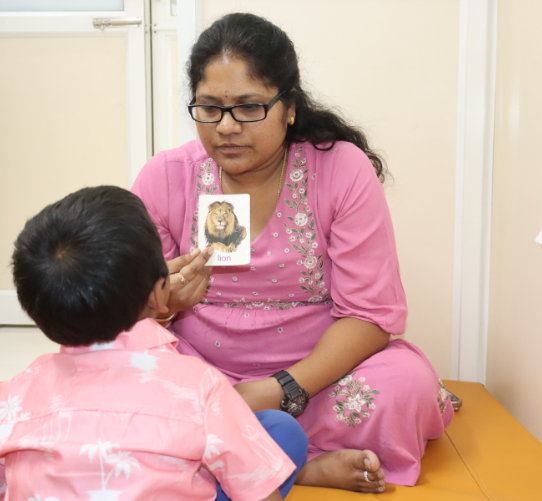Speech Therapy
“Finding Your Voice: Empowerment Through Speech Therapy!”
Speech Therapy
Speech delay is a condition in which children are not able to speak or use language as per the expected age. At Ashoka child development centre, we consider that, if parents or caregivers suspect that a child has a speech delay, they can seek immediate evaluation and guidance from our speech-language pathologist or a developmental pediatrician.
Ashoka child development centre’s early intervention helps in addressing speech delays and promoting optimal language development. Focused interventions may include speech therapy, educational support, and strategies for parents to enhance communication at home.
Features
Individualized Assessment:
Speech-language pathologists (SLPs) conduct a thorough assessment to understand the child’s specific speech and language challenges. This assessment helps tailor the therapy to the child’s unique needs.
Identification of Speech and Language Goals:
Based on the assessment, therapists work with parents and caregivers to set specific and achievable speech and language goals for the child. These goals address areas such as vocabulary, sentence structure, articulation, and communication skills.
Speech Sound Training:
For children with articulation or phonological disorders, therapy may include activities to improve speech sound production. This could involve exercises targeting specific sounds that the child finds challenging.
Language Development Activities:
Therapists use various activities to promote language development, including vocabulary building, sentence construction, and comprehension exercises. These activities are often engaging and tailored to the child’s interests.
Social Communication Skills:
Therapies focus on improving child’s social communication skills, including turn-taking, initiating and maintaining conversations, and understanding nonverbal cues.
Parent/Caregiver Involvement:
Our therapists actively involve parents or caregivers to develop the child’s speech and language development at home.
Play-Based Therapy:
Play is often used as a natural and enjoyable way to facilitate speech and language development. Play-based therapy can include games, toys, and activities that target specific language goals while keeping the child engaged.
Augmentative and Alternative Communication (AAC):
For children who struggle with verbal communication, therapists may introduce AAC methods, such as picture communication boards or electronic devices, to enhance communication skills.
Use of Technology:
Technology, such as apps and interactive software, may be incorporated into therapy sessions to make learning more engaging and to provide additional resources for practice.
Behavioral Strategies:
Therapists may employ behavioral strategies to address challenging behaviors that can impact communication. Positive reinforcement and behavior modification techniques may be used.
Progress Monitoring:
Regular assessments are conducted to monitor the child’s progress and adjust therapy goals as needed. Progress reports are typically shared with parents to keep them informed.
Collaboration with Other Professionals:
Speech delay therapies often involve collaboration with other professionals, such as educators, occupational therapists, and pediatricians, to address the child’s overall development comprehensively.
Early Intervention:
Early intervention is crucial for addressing speech delays. Therapies are often initiated as soon as concerns are identified to maximize the potential for positive outcomes.
Speech Therapy





Benefits
Improved Communication Skills:
We enhance the child’s ability to communicate effectively that includes vocabulary, sentence structure, and overall expressive and receptive language skills.
Enhanced Articulation:
For children with articulation difficulties, speech therapy can improve the clarity of speech by targeting specific sounds and addressing pronunciation issues.
Increased Vocabulary:
Speech delay therapies often focus on expanding a child’s vocabulary, helping them acquire and use a broader range of words to express themselves.
Better Sentence Structure:
Therapies work on improving sentence structure and grammar, enabling children to construct more complex and grammatically correct sentences.
Development of Social Communication Skills:
Speech therapies address social communication skills, including turn-taking, initiating and maintaining conversations, and understanding nonverbal cues. This contributes to improved social interactions.
Enhanced Phonological Awareness:
Phonological awareness helps to recognize and manipulate the sounds of spoken language. Speech therapies help develop phonological awareness, which is essential for reading and writing skills.
Reduced Frustration:
Improved communication skills can reduce frustration for both the child and their caregivers. As the child becomes better able to express themselves, they may experience less frustration in daily interactions.
Increased Confidence:
A successful speech therapy helps to boost the confidence level of children. So, there is greater willingness to participate in conversations and social activities.
Academic Success:
Speech delay therapies can contribute to academic success by addressing language skills essential for reading, writing, and comprehension.
Improved Self-Esteem:
Once the communication skills are improved, the children get confidence in their ability to express thoughts and feelings.
Positive Social Relationships:
Improved communication skills contribute to positive social relationships. Children are better equipped to form friendships and engage in social interactions.
Better Behavioral Regulation:
Addressing communication challenges can have a positive impact on behavioral regulation. Children may experience reduced frustration and improved self-control.
Parent/Caregiver Education and Support:
Speech delay therapies often involve educating parents and caregivers about strategies to support the child’s communication development at home.
Early Intervention for Underlying Issues:
Speech delay therapies can identify and address underlying issues that may contribute to communication challenges. Early intervention is crucial for addressing these issues before they become more entrenched.
Preparation for Educational Transitions:
Ashoka Rehab’s improved communication skills can better prepare a child for transitions in their educational journey, such as starting school. This can contribute to a smoother transition and academic success.
